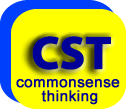


We cannot rid society from all crime. The question is how do we reduce it and how do we deal with the outcome.
CST - We need to have a grown up review with this subject - most politicians will not tackle it as they know it becomes too emotive & they lose votes.
There needs to be a straight forward rational approach here and CST starts with the basic concept; For the society as a whole there is no such thing as 'punishment'. There is only 'deterrence' and rehabilitation.
Clearly there is also an ongoing need to keep (a small number) of individuals away from the society until they are no longer a danger to society.
That is not to say that the deterrence should not be a real deterrence. Rehabilitation is very expensive, but still cheaper than extensive policing, social costs and recurring prison costs.
After this period - which will depend on the crime committed, there will be a full rehabilitation. This means help, education, counseling and then a job (using the Job Hubs for Welfare Reform) and along with living accommodation. This extended rehabilitation will continue for say two to three years to ensure that the individual is fully engaged in normal society.
Now the sceptics will say that this rehabilitation is just rewarding the criminal activity - this is to some extent true, but the initial very harsh prison environment will deter those who think that this is a simple way to get a job and ongoing help. If an offender returns, then the initial harsh prison sentence will be double and then doubled again and so on. This should, for all but the mentally ill (this is a quite different issue of course and not insignificant within our prisons), be enough of a deterrence and enable the prison numbers to fall dramatically.
Running these new types of institutions will be quite different. The Initial harsh prison stay needs few prison officers, as all the individuals would effectively be kept in solitary confinement. Meals, water, provisions, working and fitness areas can be mostly automated. The cost of running these prisons will be much less than the standard system today.
Again, the sceptics will all point to human rights. As a society we need to be strong and take the difficult decisions for the right reasons. On balance, even for offenders themselves they will gain more than they lose in the longer term.

.




Some countries have an enlightened policy on drugs and have already decriminalised most hard drugs. This, coupled to a well defined, well implemented, drug distribution and control process would remove the need for drug users to turn to crime to feed their habit and in turn remove the people involved from drug trafficking from the streets.
This reform may give the impression that the UK would go soft on drugs. This however is missing the point entirely. CST believes the success, (or not), of such a scheme is in the detail, and the long term success is the only point we need to be concerned with.
The drugs themselves should not be free but sold to users, (who would be on a 'drugs users register'), at a profit for the state to re-invest. This profit, along with the huge, direct savings for policing, health care, the judicial systems and prisons would initially be used to fund a really professional and effective programme to get these users off their habit. For occasional users, the drugs users register will be used to monitor their health. If, in future, they require medical treatment that is directly attributed to drug use, they would need to pay for this treatment. To get on the register, drug users, or potential users, would be required to pay up-front and go through counseling and information sessions before any drug purchase. If they decide not to purchase after these sessions they get their money refunded.
The other reforms CST puts forward for education, welfare and prisons all help to keep people who may succumb to drug use from this self-harm. Effective rehabilitation and precise long-term monitoring should provide the drug users with a renewed sense of themselves and hopefully to a much more fulfilling life in the future.
The facts speak for themselves, but it is our own prejudices that prevent us as a society from ‘radical action'. The theme here again is straightforward commonsense, it is about moving the costs for the society from consuming to investing. Investing in the prevention of drug use and not in the consumption of resources involved in dealing with the many consequences. – IG
We don't need any statistics to know that accidents are caused by inattention, poorly applied driving skills and drivers without basic cognitive abilities and good sight. We see this every single day when we travel locally or long distance - CST - some of whom ride motorcycles and are very aware of the hazards)
The simple, cost effective solution is to ensure all current and new drivers pass an advanced driving test. This should be paid for by drivers themselves - after all it is they who are causing the accidents, (in most instances these are easily avoidable).
Over a period of say 5 years, every driver would be required to pass the advanced test. If they fail three time then they would need to start over by passing the initial driving test.
New drivers would need to pass the advanced test within 3 years. The minimum experience they would need before applying would be in the region of 5,000 miles to ensure competence at a high level.
The potential savings to the society as a whole are truly significant - policing costs, heath costs, insurance reduction across the board and peace of mind when traveling on our congested roads.